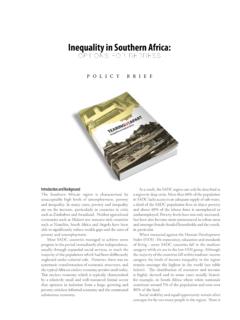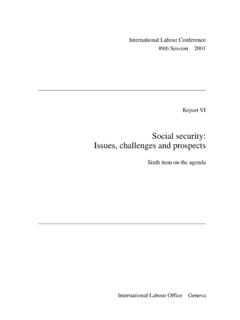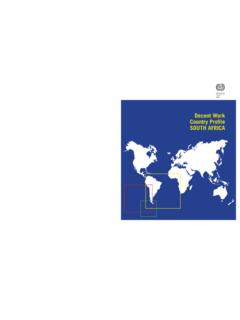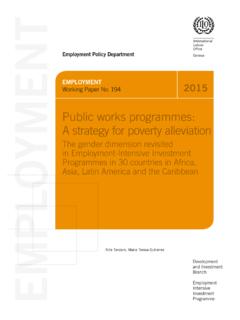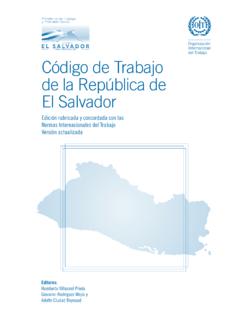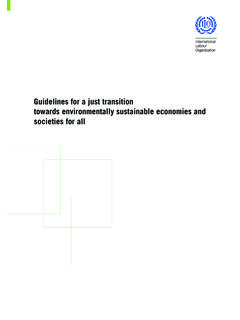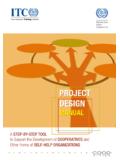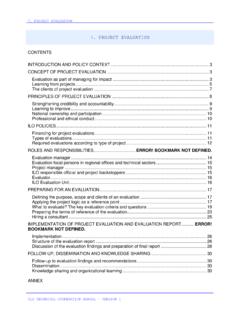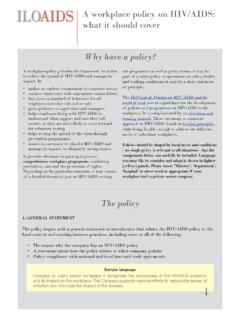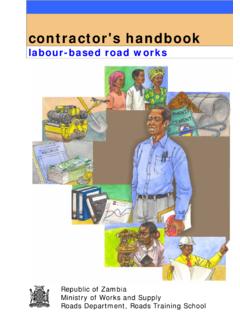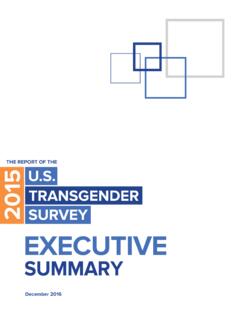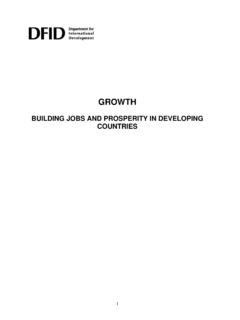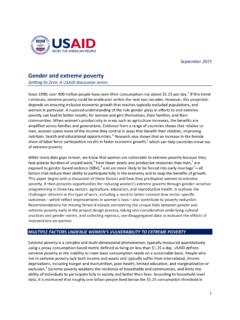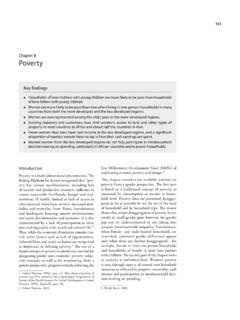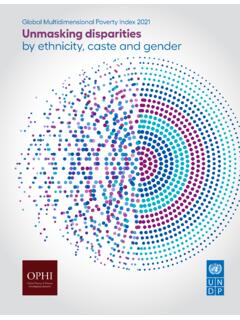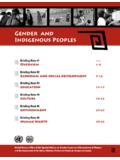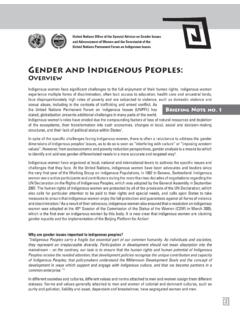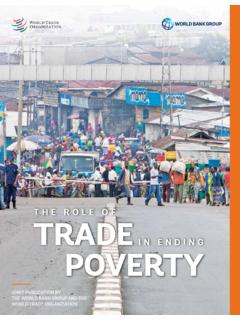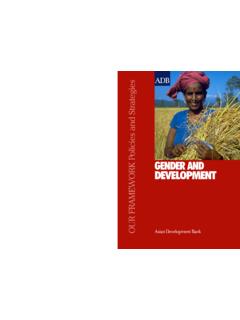Transcription of NATIONAL GENDER POLICY
1 Mainstreaming GENDER Equality and Women s Empowerment into Ghana s Development EffortsTHEMEMay, 2015 NATIONAL GENDER POLICYM ainstreaming GENDER Equality and Women s Empowerment into Ghana s Development EffortsTHEME:May, 2015 MINISTRY OF GENDER ,CHILDREN AND SOCIAL PROTECTION HIS EXCELLENCY JOHN DRAMANI MAHAMA PRESIDENT OF THE REPUBLIC OF GHANAMINISTRY OF GENDER ,CHILDREN AND SOCIAL PROTECTION FOREWORDThe Government of Ghana (GOG) made a commitment in the promotion of women s human rights and empowerment with the ratification of key International Instruments, to the Millennium Development Goals and Ghana s NATIONAL Development Frameworks. With the introduction of the NATIONAL GENDER POLICY , the Government seeks to re-emphasize its greater objectives, to continue working tirelessly for the greater development of both men and women. It is our belief that continuing to reduce poverty levels, improving health and living standards in Ghana is contingent upon the formulation of effective policies that promote GENDER equality, equity and women s empowerment at all levels and is crucial, that, Government has a POLICY that further enhances women s rights and continues to provide a clear framework for addressing inequalities deeply rooted in our society.
2 The NATIONAL GENDER POLICY has been developed with comprehensive insights into the empowerment, rights and access to justice, leadership and accountable governance, GENDER roles and relations, and economic opportunities for NATIONAL GENDER POLICY development process was consultative guided by key stakeholder inputs at the NATIONAL , regional and district levels, and with the participation of both government and non-government agencies, development partners, traditional authorities, and the Media across the country. We introduce this NATIONAL GENDER POLICY hoping for its success of inclusivity in the lives of all the sexes. Let us work together to forge a path that ensures women and men, boys and girls, the marginalized, the vulnerable all have an equal voice, opportunity and can also benefit from our society at all levels. Thank you, Nana Oye Lithur Minister for GENDER , Children and Social Protection NATIONAL GENDER POLICYvACKNOWLEDGEMENTThe Ministry of GENDER , Children and Social Protection expresses appreciation to individuals and institutions that played significant roles in the development of this.
3 We wish to express our gratitude to former President John Agyekum Kuffour for establishing a women s Ministry and giving it a Cabinet status; the late President John Evans Atta-Mills for his special impetus and support for women s empowerment and GENDER equality matters. His Excellency John Dramani Mahama for renaming and expanding the mandate of the Ministry to include GENDER , children and social of former Ministers including the late Hon. Gladys Asmah, Hon. Alima Mahama, Hon. Akua Sena Dansua, Hon. Juliana Azumah-Mensah as well as the current Minister Hon Nana Oye Lithur for providing quality leadership in championing the cause of women in Ghana and most importantly the development processes of this acknowledgement goes to Cabinet and its members, Minsitry Departments and Agencies (MDAs), Metropoltan Municipal and District Assemblies (MMDAs), GENDER Equality Sector Team (GEST) members, Civil Society Organizations (CSOs)for their in-depth contributions to the review and feedback on gaps in the document for also highly appreciate Development Partners such as UNFPA, UN Women, WFP for providing technical and financial support towards the development processes of the are also grateful to individual GENDER activists, experts and interest groups who made contributions directly and through validation meetings in finalizing the POLICY .
4 Efforts of the media are also much further acknowledge the technical team of the Ministry of GENDER , Children and Social Protection who provided technical expertise in coordinating the development of the , special thanks go to the various consultants who at different times worked on the document (Jane Kwawu, Dr. Smile Dzisi; and Gideon Hosu-Porbley). NATIONAL GENDER POLICYviEXECUTIVE SUMMARYG ender Equality and Women Empowerment are strategies for reducing poverty levels, social injustices among women and men, improving health standards and enhancing efficiency of public and private sector investments and domestic finance. Thus, achieving GENDER equality is regarded as the attainment of human rights and a pre-requisite for sustainable development. Ghana s goals towards achieving GENDER equality targets are guided by its commitment to International Instruments, the 1992 Constitution and NATIONAL development frameworks.
5 Specifically, Article 17(1) and (2) of the 1992 Constitution guarantees GENDER equality and freedom of women and men, girls and boys from discrimination on the basis of social or economic status among others. Efforts of Ghana in the promotion of GENDER equality and the empowerment of women, men, girls and boys are evident in its recent achievements as contained in various international indices such as HDI ( ), GII ( ) and the SIGI ( ).The overarching goal of this POLICY is to mainstream GENDER equality concerns into the NATIONAL development processes by improving the social, legal, civic, political, economic and socio-cultural conditions of the people of Ghana particularly women, girls, children, the vulnerable and people with special needs; persons with disability and the marginalized. Stakeholders in the sector will be expected to take strategic POLICY actions as directed by this POLICY to address bottlenecks and barriers and critical issues existing alongside the successes.
6 These issues of concern include: Inequality in access to social protection by the marginalized, vulnerable and the poor. Inequalities in the burden of extreme poverty , education, skilled training gaps and excess maternal mortality. Unequal access to social, economic power and justice including lack of respect for and inadequate protection and promotion of human rights of women and girls. Inequalities between women and men in sharing of power and decision making at all levels and in dealing with all kinds of conflicts, in securities and threats on women and girls. Inequality in macro-economic issues including trade, industry structures and productive resources. Stereotyping and persistent discrimination against women and girls that manifest in negative GENDER relations, and value for GENDER roles and responsibilities with severe implication for maternal health and of the gains made so far, these inequalities listed, are still deeply rooted in the social system and manifest particularly in matters of access to justice, health, finance, education, security, politics, energy, agricultural practices, environmental management processes among others.
7 Assessments have indicated that these causes are attributable to the historical legacy of patriarchal influences and the form of socialization received from homes to public settings. NATIONAL GENDER POLICYviiIn an attempt to address the challenges posed by these inequities, successive governments of Ghana have made conscious efforts by promoting girl-child education, social development and protection initiative such as distributing free school uniforms, free exercise books, skilled training for young women, free ante-natal services for pregnant women, access to credit in the form of programmes such as the Livelihood Empowerment against poverty among others. The Government has also improved the legal environment through the enactment of statutes including the Domestic Violence Act, 2007 (Act 732) to aggressively tackle GENDER inequality and the promotion of the welfare of women and is evident that men s and boy s involvement in removing systemic Social-cultural practices that slow down women s empowerment especially ending violence against women and girls and improving GENDER relationships in homes and public places is affirmed as an important POLICY issue.
8 Social protection issues for marginalized and vulnerable groups such as the homeless and the displaced and other sub groups such as Kayayei,1 persons with disability are firmly placed on the agenda in this POLICY although a separate social protection POLICY will be developed specifically to address vulnerability and social protection the context of the 1992 Constitution requirements, development frameworks as well as International Instruments, the NATIONAL GENDER POLICY focuses on mainstreaming GENDER equality, women empowerment and social protection concerns by strongly concentrating on the implementation of the following five POLICY commitments (representing POLICY objectives):1. Women s Empowerment and Livelihood 2. Women s Rights and Access to Justice 3. Women s Leadership and Accountable Governance, 4. Economic Opportunities for Women 5. GENDER Roles and Relations The application of Information and communication Technology (ICT) tools, skill development, advocacy, lobbying, negotiation, mobilization, transformational leadership, research, monitoring and evaluation are key strategies listed for action towards achieving the goal and objectives / commitments of this POLICY .
9 Clear POLICY level roles and responsibilities are suggested to be played by identified state and non-state actors, including Civil Society Organizations (CSOs), the media, the private sector, Traditional Authorities, and local communities for efficiency and effectiveness in achieving results. The Ministry of GENDER , Children and Social Protection will be the main machinery to drive all the POLICY actions using a Strategic Implementation Plan to actualise the POLICY objectives. 1 a Ghanaian term that refers to a female porter or bearer who possibly have migrated from a rural community to any of Ghana s urban cities in search of workNATIONAL GENDER POLICY viiiMainstreaming GENDER Equality and Women s Empowerment into Ghana s Development EffortsTHEME:May, 2015 NATIONAL GENDER POLICYixACRONYMS ACHPR African Charter on Human and Peoples RightsACRWC African Charter on the Rights and Welfare of the Child ADR Alternative Dispute ResolutionAG Attorney General AGOA African Growth and Opportunity ActAGREDS Assemblies of God Relief and Development Services AIDS Acquired Immune Deficiency Syndrome ARV Anti-RetroviralASPIP Annual School Performance Improvement Plan AU African Union AWL A African Women Lawyers AssociationB&DR Births and Deaths RegistryCAGD Controller and Accountant General s Department CAN Child Abuse Network CEDAW Convention on the Elimination of all forms of Discrimination Against Women CHIPS Community Based Health Planning Service CHRAJ Commission on Human Rights and Administrative Justice CIDA Canadian International Development AgencyCIS Children Information Service CRC Convention on the Rights of the Child CSIR Council for
10 Scientific and Industrial Research CSO Civil Society Organization CSW Commission on the Status of Women CWSA Community Water and Sanitation Agency DA District AssemblyDFATD Department of Foreign Affairs, Trade and Development, DHS Demographic Health Survey DISCAP District Capacity Building ProjectDISEC District Security Committee DOC Department of Children DOVVSU Domestic Violence and Victim Support Unit DOG Department of GenderNATIONAL GENDER POLICYxDP Development Partners DPCU District Planning Coordinating Unit DVS Domestic Violence Secretariat ECA Economic Commission for Africa ECCD Early Childhood Care and Development ECOSOC Covenant on Economic Social and Cultural RightsECOWAS Economic Community of West African States EMIS Education Management Information System EPA Environmental Protection Agency EPI Expanded Programme on ImmunizationESP Education Strategic Plan FAO Food and Agriculture Organisation FGM Female Genital Mutilation FIDA International Federation of Women LawyersGAC Ghana AIDS CommissionGAD GENDER and Development GAWU Ghana Association of Workers Union GDOs GENDER Desk Officers GDP Gross
